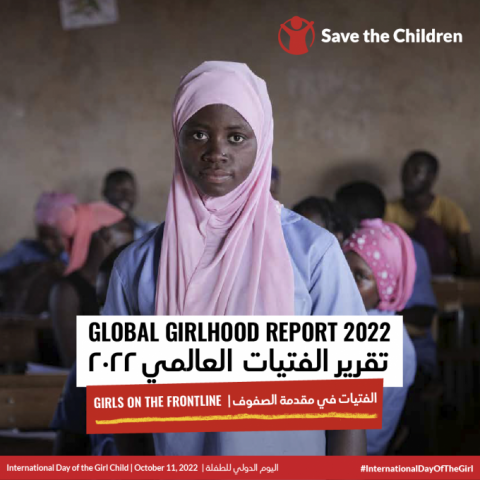Global Girlhood Report 2022: Girls on the Frontline

This year marks the 10th anniversary of the first International Day of the Girl. Since the first commemoration on the 11th of October 2012, which was centered around the theme of Ending Child Marriage, governments, civil society, and other actors around the world have committed to work toward an end to this violation of girls’ rights. Although global progress has been made, accelerated action is needed to meet the Sustainable Development target to end child marriage by 2030.
Save the Children’s latest report, The Global Girlhood Report 2022: Girls on the Frontline, takes stock of progress and challenges toward ending child marriage over the last ten years. It also includes new data analysis on the intersections of conflict and child marriage and highlights the voices of girls who have been displaced and experienced child marriage.
Key Findings include:
- New research shows nearly 90 million (89.2M) adolescent girls – almost 1 in 5 – are living within 50kms of conflict. These girls face higher risk factors for child marriage, including increasing poverty and food shortages, exposure to other forms of gender-based violence, the likelihood of unintended pregnancy, and a breakdown of systems that are meant to protect them.
- Our analysis shows that, globally, girls affected by conflict are 20% more likely to marry as children than girls living outside of conflict zones.
- Girls experience gender-based violence in all conflicts but gender-based violence and child protection are the least-funded protection priorities in humanitarian crises. Girls cannot wait for proof in every new conflict – we have the evidence now to plan and fund prevention, mitigation and response services for gender-based violence in every humanitarian response.
- The 4 C’s - conflict, the COVID-19 crisis, climate emergency and rising costs – are new and ongoing barriers to ending child marriage. Like humanitarian crises, these overlapping challenges increase poverty and weaken protection for girls, putting them at greater risk of gender-based violence, including child marriage.
- Girls deserve better options than child marriage. Ending child marriage and fulfilling the rights of married girls means recognizing girls’ agency, tackling the patriarchal norms that limit their freedoms and investing in girls’ safety, education and sexual and reproductive health and rights – especially during humanitarian crises.
Girls are forced to stand on the frontline of the world’s most pressing issues, and they need our support. Save the Children is grateful for your partnership in advancing girls’ rights through [ADD CONTEXT RELEVANT ACTION]. We encourage you to read the executive summary of our report and take essential action to invest in girls, include them in policy processes, and prevent, mitigate, and address the harmful impacts of child marriage. I would especially like to draw your attention to these priority actions relevant to your goals:
- Increase funding and efforts to address gender-based violence against girls, including through funding child protection in humanitarian crises.
- Scale-up evidence-based initiatives to end child marriage and make them available to more girls in more places.
- Support and invest in girls to define solutions to the challenges they face by strengthening girl-led movements. This means finding new ways of working with and providing funding to girls.
- Develop and fully-fund national action plans to end child marriage and other forms of gender-based violence and violence against children.
- Improve understandings of how to prevent the "four C's" from reversing progress to end child marriage.
- Ensure that governments uphold their promises for girls made in global agreements.
 Sudan
Sudan